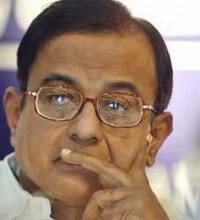 The Union Finance Minister Shri P. Chidambaram said that the economic and political developments in the Eurozone area and the United States had its impact on the world economy including our economy. However, slew of reform measures taken by the Government had a positive impact on the market sentiments, the Minister added. He said that resolution of ‘fiscal cliff’ in US recently too had a positive impact on the market sentiments worldwide including India. The Finance Minister Shri P.Chidambaram was making his opening remarks during his Fifth Pre-Budget Consultation Meeting with Economists’ Group here today. The Finance Minister said that there are mixed signals from market regarding the current economic situation in the country. He said that direct tax collections are satisfactory while indirect taxes including excise duty etc are falling short of expectations. The Finance Minister said that difficult phase is over and now focus would be on achieving higher growth during the year.
The Union Finance Minister Shri P. Chidambaram said that the economic and political developments in the Eurozone area and the United States had its impact on the world economy including our economy. However, slew of reform measures taken by the Government had a positive impact on the market sentiments, the Minister added. He said that resolution of ‘fiscal cliff’ in US recently too had a positive impact on the market sentiments worldwide including India. The Finance Minister Shri P.Chidambaram was making his opening remarks during his Fifth Pre-Budget Consultation Meeting with Economists’ Group here today. The Finance Minister said that there are mixed signals from market regarding the current economic situation in the country. He said that direct tax collections are satisfactory while indirect taxes including excise duty etc are falling short of expectations. The Finance Minister said that difficult phase is over and now focus would be on achieving higher growth during the year.
Along with the Finance Minister, both the Minister of State for Finance Shri S.S. Palanimanickam and Shri Namo Narain Meena, Adviser to the Finance Minister, Shri Parthasarthy Shome, Finance Secretary, Shri R.S. Gujral, Secretary, Financial Services & Disinvestment, Shri D.K. Mittal, Revenue Secretary, Shri Sumit Bose, Secretary, Department of Economic Affairs, Shri Arvind Mayaram, Chief Economic Adviser, Dr. Raghuram R. Rajan, and Chairman CBEC were present among others.
About 11 Economists representing different Organisations participated in the aforesaid meeting. The major participants included Dr. Surjit Bhalla, OXUS Research and Investments, Shri Nitin Desai, Dr. Omkar Goswami, CERG Advisory, Dr. Rajiv Kumar, Porf. Pulin Nayak, Delhi School of Economics, Shri Bharat Ramaswamy, ISI Delhi, Shri Ajit Ranade, Aditya Birla Group, Dr. Shekhar Shah, NCAER, Prof. Rohini Somanathan, Delhi School of Economics, Dr. D.K. Srivastava, Madras School of Economics and Prof. Amar Yumnam, School of Social Sciences, Manipur among others.
Various suggestions and proposals were received from participants during the aforesaid meeting which include to set-up Asset Management Office especially to manage central Government Urban land in various metro, two tier and three tier cities. Another suggestion included following of principle of progressivity i.e. higher tax rates for high income group, widening of tax base and effective enforcement of tax laws to penalise those who hide their income and pay less tax as well as those who despite high income do not pay any tax at all. Many participants favoured introduction of inheritance tax and certainty in tax laws and early resolution of tax disputes in a time bound manner to release money locked in it.
Some participants suggested make reforms at regular intervals to keep the market sentiments high. Another proposal was to put BASEL III Reforms on hold for a year keeping in view the current economic situation. Another suggestion was to give incentives to boost small savings schemes as savings under these schemes have gone down by 5% over the years. Another suggestion was made to reduce the interest rate and agriculture credit be doubled.
Another suggestion was made to shift this consultation process in October when the budget making process starts. Another recommendation was made to improve investment cycle by removing uncertainty in tax laws, investor friendly tax regime and rationalisation of Centrally Sponsored Schemes among others. Some participants recommended for quick action to bring inflation down to the level of 4%-5 % at the earliest, higher investment in health & education sector, higher capital expenditure on agriculture and for increasing storage capacity for food grains. Some suggested that budget should promote renewable energy and also help in bringing pollution level low to improve quality of life especially in metro and big cities. Another suggestion was made to increase fees for higher studies in Universities and professional institutions and divert extra funds for primary and secondary education for poor and weaker section of society.
